| Listing 1 - 10 of 31 | << page >> |
Sort by
|
Periodical
Year: 2001 Publisher: Iowa City, Ia. : University of Iowa
Abstract | Keywords | Export | Availability | Bookmark
 Loading...
Loading...Choose an application
- Reference Manager
- EndNote
- RefWorks (Direct export to RefWorks)
An interdisciplinary journal of rhetorical analysis and invention in all fields of learning.
Book
ISBN: 9783946317715 3946317715 Year: 2020 Publisher: Göttingen Vandenhoeck & Ruprecht/Verlag Antike
Abstract | Keywords | Export | Availability | Bookmark
 Loading...
Loading...Choose an application
- Reference Manager
- EndNote
- RefWorks (Direct export to RefWorks)
Der Karl-Christ-Preis, der dem Andenken an den Marburger Althistoriker Karl Christ gewidmet (1923?2008) ist, wurde im Jahr 2019 an den Ordinarius für Alte Geschichte der TU Dresden Martin Jehne verliehen. Jehne genießt als vorzüglicher Kenner der Geschichte der römischen Republik national wie international höchstes Ansehen. Seine wissenschaftsgeschichtlich und theoretisch reflektierten Beiträge zur politischen Kultur im Altertum sind weit über die Grenzen seines Faches rezipiert worden. In seinem herausragenden Einsatz für den akademischen Nachwuchs weiß er sich dem Erbe Karl Christs verpflichtet.
Invention (Rhetoric) --- Communication in politics --- History --- Rome.
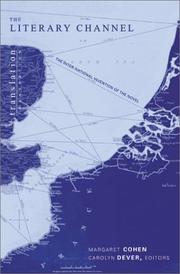
ISBN: 0691050023 0691050015 9786612696060 1282696068 1400829518 9781400829514 9780691050027 9780691050010 9781282696068 6612696060 Year: 2002 Publisher: Princeton, N.J. Princeton University Press
Abstract | Keywords | Export | Availability | Bookmark
 Loading...
Loading...Choose an application
- Reference Manager
- EndNote
- RefWorks (Direct export to RefWorks)
The Literary Channel defines a crucial transnational literary "zone" that shaped the development of the modern novel. During the first two centuries of the genre's history, Britain and France were locked in political, economic, and military struggle. The period also saw British and French writers, critics, and readers enthusiastically exchanging works, codes, and theories of the novel. Building on both nationally based literary history and comparatist work on poetics, this book rethinks the genre's evolution as marking the power and limits of modern cultural nationalism. In the Channel zone, the novel developed through interactions among texts, readers, writers, and translators that inextricably linked national literary cultures. It served as a forum to promote and critique nationalist clichés, whether from the standpoint of Enlightenment cosmopolitanism, the insurgent nationalism of colonized spaces, or the non-nationalized culture of consumption. In the process, the Channel zone promoted codes that became the genre's hallmarks, including the sentimental poetics that would shape fiction through the nineteenth century. Uniting leading critics who bridge literary history and theory, The Literary Channel will appeal to all readers attentive to the future of literary studies, as well as those interested in the novel's development, British and French cultural history, and extra-national patterns of cultural exchange. Contributors include April Alliston, Emily Apter, Margaret Cohen, Joan DeJean, Carolyn Dever, Lynn Festa, Françoise Lionnet, Deidre Shauna Lynch, Sharon Marcus, Richard Maxwell, and Mary Helen McMurran.
Fiction --- Invention (Rhetoric). --- History and criticism. --- Invention (Rhetoric) --- Rhetoric --- Comparative literature --- French literature --- English literature --- History and criticism --- E-books
Book
ISBN: 1501732676 150172732X 9781501727320 Year: 2018 Publisher: Ithaca, NY
Abstract | Keywords | Export | Availability | Bookmark
 Loading...
Loading...Choose an application
- Reference Manager
- EndNote
- RefWorks (Direct export to RefWorks)
In a book that draws attention to some of our most familiar and unquestioned habits of thought-from "framing" to "perspective" to "reflection"-Rayna Kalas suggests that metaphors of the poetic imagination were once distinctly material and technical in character. Kalas explores the visual culture of the English Renaissance by way of the poetic image, showing that English writers avoided charges of idolatry and fancy through conceits that were visual, but not pictorial. Frames, mirrors, and windows have been pervasive and enduring metaphors for texts from classical antiquity to modernity; as a result, those metaphors seem universally to emphasize the mimetic function of language, dividing reality from the text that represents it. This book dissociates those metaphors from their earlier and later formulations in order to demonstrate that figurative language was material in translating signs and images out of a sacred and iconic context and into an aesthetic and representational one. Reading specific poetic images-in works by Spenser, Shakespeare, Gascoigne, Bacon, and Nashe-together with material innovations in frames and glass, Kalas reveals both the immanence and the agency of figurative language in the early modern period.Frame, Glass, Verse shows, finally, how this earlier understanding of poetic language has been obscured by a modern idea of framing that has structured our apprehension of works of art, concepts, and even historical periods. Kalas presents archival research in the history of frames, mirrors, windows, lenses, and reliquaries that will be of interest to art historians, cultural theorists, historians of science, and literary critics alike. Throughout Frame, Glass, Verse, she challenges readers to rethink the relationship of poetry to technology.
Renaissance --- Invention (Rhetoric) --- Mirrors in literature. --- Poetics --- Frame-stories --- English poetry --- Rhetoric --- History --- History and criticism.
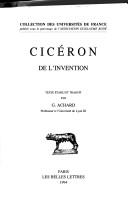
ISBN: 2251013814 9782251013817 Year: 1994 Volume: 320 Publisher: Paris: Les Belles Lettres,
Abstract | Keywords | Export | Availability | Bookmark
 Loading...
Loading...Choose an application
- Reference Manager
- EndNote
- RefWorks (Direct export to RefWorks)
Classical Latin literature --- Invention (Rhetoric) --- Rhetoric --- #GOSA:V.Oud.Cic.O --- Language and languages --- Speaking --- Rhetoric, Ancient. --- Rhétorique --- Rhétorique ancienne --- Early works to 1800 --- Ouvrages avant 1800 --- Invention (Rhetoric) - Early works to 1800. --- Rhetoric - Early works to 1800.
Book
ISBN: 9788880861843 8880861840 Year: 1998 Publisher: Galatina: Congedo,
Abstract | Keywords | Export | Availability | Bookmark
 Loading...
Loading...Choose an application
- Reference Manager
- EndNote
- RefWorks (Direct export to RefWorks)
Invention (Rhetoric) --- Invention (Rhetoric) - Early works to 1800 --- Rhetoric --- Latin literature --- Invention (Rhétorique) --- Littérature latine --- Early works to 1800 --- History and criticism --- Ouvrages anciens jusqu'en 1800 --- Histoire et critique --- Cicero, Marcus Tullius.
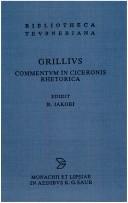
ISBN: 3598712308 9783598712302 Year: 2002 Publisher: München: Saur,
Abstract | Keywords | Export | Availability | Bookmark
 Loading...
Loading...Choose an application
- Reference Manager
- EndNote
- RefWorks (Direct export to RefWorks)
Invention (Rhetoric) --- Rhetoric, Ancient --- Ancient rhetoric --- Classical languages --- Greek language --- Greek rhetoric --- Latin language --- Latin rhetoric --- Rhetoric --- Cicero, Marcus Tullius. --- Invention (Rhetoric) - Early works to 1800. --- Rhetoric, Ancient. --- Cicero, Marcus Tullius - De inventione --- Rhétorique ancienne --- Commentaries.
Book
ISBN: 9004673822 Year: 1978 Publisher: Leiden : Brill,
Abstract | Keywords | Export | Availability | Bookmark
 Loading...
Loading...Choose an application
- Reference Manager
- EndNote
- RefWorks (Direct export to RefWorks)
Epic poetry, Greek --- Invention (Rhetoric) --- Oral-formulaic analysis. --- Oral tradition --- Rhetoric, Ancient. --- History and criticism. --- History --- Homer --- Technique.
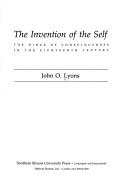
ISBN: 0809308150 Year: 1978 Publisher: Carbondale Southern Illinois university press
Abstract | Keywords | Export | Availability | Bookmark
 Loading...
Loading...Choose an application
- Reference Manager
- EndNote
- RefWorks (Direct export to RefWorks)
Civilization, Modern --- Consciousness in literature --- Invention (Rhetoric) --- Literature, Modern --- Self --- Self in literature --- History --- History and criticism
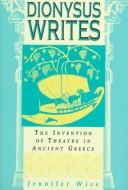
ISBN: 0801434599 0801486939 1501744941 Year: 1998 Publisher: Ithaca (N.Y.): Cornell university press
Abstract | Keywords | Export | Availability | Bookmark
 Loading...
Loading...Choose an application
- Reference Manager
- EndNote
- RefWorks (Direct export to RefWorks)
Dionysus (Greek deity) --- Greek drama --- Invention (Rhetoric) --- Literacy --- Literary form --- Theater --- Written communication --- History and criticism --- Theory, etc --- History
| Listing 1 - 10 of 31 | << page >> |
Sort by
|

 Search
Search Feedback
Feedback About UniCat
About UniCat  Help
Help News
News